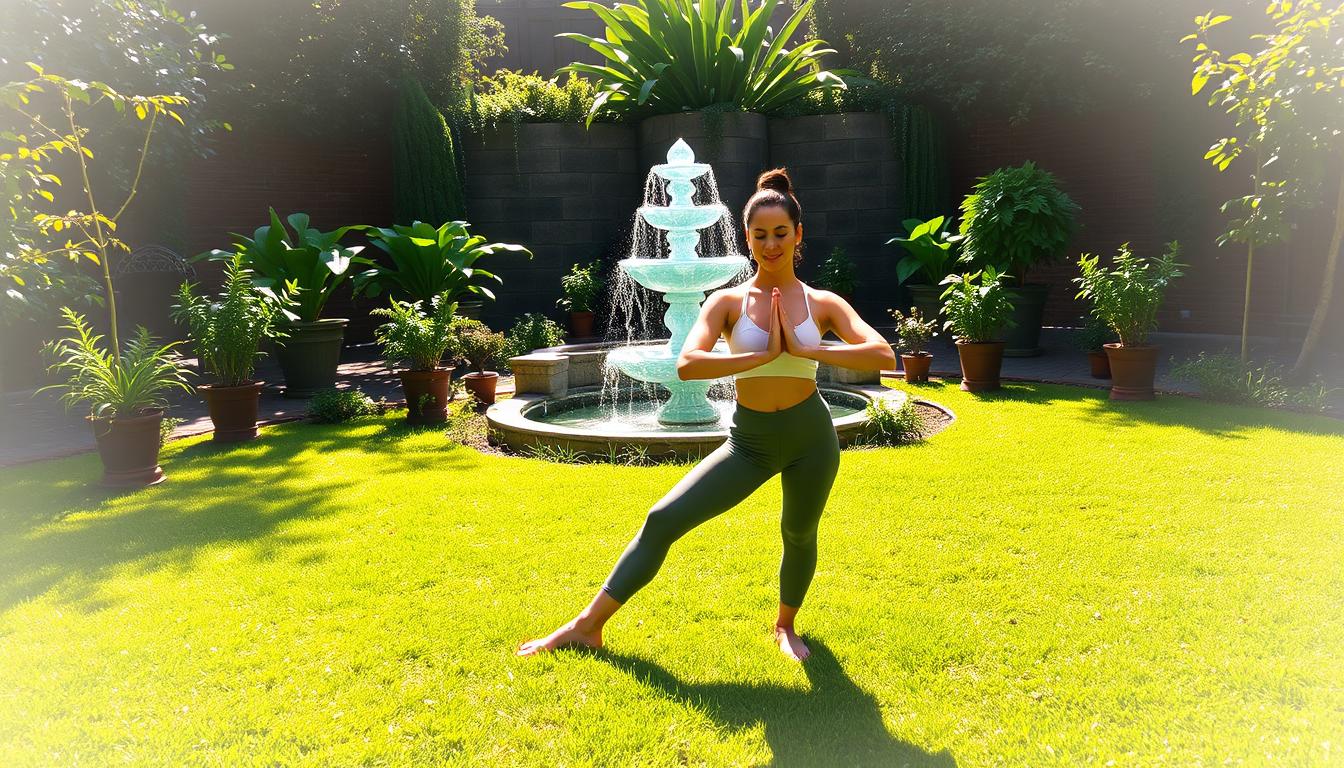Ever feel like you’re always running behind, with no time for yourself? We often put others first, leaving our own health last. Imagine waking up every day feeling refreshed and ready to go. The path to a healthier you is simple.
By adding a few easy wellness tips to your day, you can improve your body and mind. We’ll show you how to make self-care, mindfulness, healthy eating, and exercise part of your routine. It’s time to put your wellbeing first and start living a more balanced life.
Key Takeaways
- Wellness includes your physical health, mental focus, and emotional strength.
- Simple self-care habits can greatly improve your wellbeing.
- Mindfulness helps you stay focused and lowers stress.
- Good nutrition is key to keeping your energy up and your health strong.
- Regular exercise is crucial for a healthy lifestyle.
- Having a supportive community can make your wellness journey easier.
Understanding Wellness and Its Importance
Wellness is more than just not being sick. It’s about finding balance in all areas of health. By focusing on wellness, people can live better lives. It includes physical, emotional, spiritual, and social health.
To achieve wellness, we must care for ourselves every day. This means making healthy choices and staying active.
What Does Wellness Mean?
Wellness is about making choices for a healthy life. It’s not just about being physically fit. It also involves feeling emotionally stable and having good social connections.
By working on wellness, we can improve our diet, exercise, mental health, and relationships. This helps us understand what it means to be truly well.
The Benefits of Prioritizing Wellness
Putting wellness first has many health benefits. It helps us fight off illnesses and manage stress better. It also makes us more productive and happy.
By investing in wellness, we lead more vibrant and balanced lives. It’s all about making healthy choices and caring for ourselves.
| Aspect of Wellness | Health Benefits |
|---|---|
| Physical Health | Improved immunity and energy levels |
| Emotional Health | Reduced stress and enhanced mood |
| Social Connections | Increased support and sense of belonging |
| Spiritual Health | Greater sense of purpose and fulfillment |
Simple Self-Care Practices for Everyday Wellness
Adding self-care to your daily life can really boost your well-being. It’s about knowing what you need mentally, emotionally, and physically. Having a routine and setting boundaries are key to a balanced life. Let’s look at these two important parts.
Establishing a Daily Routine
A good daily plan is a great way to care for yourself. It lets you find time for relaxation, hobbies, and thinking about yourself. Here are some tips to make a daily routine that helps you stay well:
- Start your day with mindfulness: Try meditation or deep breathing to start on a good note.
- Incorporate physical activity: A short walk or exercise can clear your mind.
- Schedule downtime: Make time for relaxation, like reading or a hobby.
- Reflect on your day: Spend a few minutes each evening thinking about your day to feel better emotionally.
Setting Boundaries for Better Self-Care
Setting boundaries is crucial for your mental and emotional health. Clear boundaries help keep your time and energy safe. This leads to healthier relationships. Here are some ways to set good boundaries:
- Learn to say no: Say no to things that might stress you out too much.
- Communicate your needs: Talk openly about what you need to respect each other’s space.
- Limit technology use: Set times when you’re not using devices to relax and focus on wellness.
Mindfulness Techniques to Enhance Your Wellbeing
Mindfulness is key to better wellbeing. It helps you focus and lowers stress. Mindful meditation is a top choice. It keeps you in the now, improving your focus and clarity.
The Power of Mindful Meditation
Mindful meditation uses breathing, guided imagery, and body scans. These help you watch your thoughts without judgment. Daily meditation brings calm and boosts wellbeing. Breathing exercises are great for calming the mind and finding balance.
Incorporating Mindfulness into Daily Activities
Mindfulness in daily life is easy and useful. Even eating and walking can be mindful. Eat slowly, noticing flavors and textures. Walk with awareness, feeling your feet and listening to sounds.
Nutrition: Fueling Your Body for Wellness
Nutrition is key to feeling your best. Knowing what your body needs helps you live a healthier life. Your needs change with age, how active you are, and your health. Learning about nutrition helps you make better food choices.
Understanding Nutritional Needs
What you need nutritionally depends on your age, lifestyle, and health goals. A balanced diet is important for your body. It should have carbs, proteins, fats, vitamins, and minerals.
Eating right boosts your energy, mood, and immune system. It’s all about giving your body what it needs.
Healthy Eating Habits to Adopt
Healthy eating habits are vital for your wellbeing. Here are some tips:
- Prioritize Whole Foods: Eat more fruits, veggies, whole grains, lean proteins, and healthy fats.
- Practice Mindful Eating: Listen to your hunger and enjoy meals without distractions.
- Balance Is Key: Eat meals that have all food groups. This ensures your body gets all the nutrients it needs.
- Stay Hydrated: Drinking enough water is essential for your body’s functions and health.
Fitness: Moving Towards a Healthier Lifestyle
Getting fit is key to a healthier life. It boosts both physical and mental health. Activities like weight management and heart health show the many benefits of being active.
Many people see a big improvement in their life quality when they start exercising regularly.
The Importance of Regular Physical Activity
Regular physical activity is crucial for many reasons:
- It improves heart health and lowers heart disease risk.
- It helps keep a healthy weight and prevents obesity.
- It boosts mental health by reducing anxiety and depression.
- It increases energy, making daily tasks easier.
- It strengthens bones and muscles, improving physical performance.
Finding the Right Exercise Routine for You
Finding an exercise routine that fits your life is important. Here are some ideas:
- Try structured gym workouts for guided training.
- Go for outdoor activities like hiking or cycling for a change of scenery.
- Join dance classes for fun and fitness.
- Swimming is a low-impact, full-body workout.
Regular exercise makes life more dynamic and fulfilling. By choosing enjoyable fitness activities, you can move towards a healthier lifestyle.
Mental Health: Nurturing Your Mind
Taking care of your mental health is key to feeling good overall. It’s important to know when you might need help. This way, you can start using good mental health strategies early on.
Recognizing the Signs of Mental Health Struggles
Feeling moody, anxious, or wanting to be alone can be signs of trouble. Changes in sleep or eating habits and feeling hopeless are also warning signs. Catching these early can help you get the support you need.
Strategies for Improving Mental Wellbeing
There are many ways to boost your mental health. Doing things like meditation, journaling, and exercising can help. Also, talking to a therapist can offer great advice. Having friends and family who support you is also crucial for your mental health.
Holistic Healing Approaches to Wellness
Exploring holistic healing opens up new ways to improve wellness. It combines body and mind practices. Many people use alternative therapies to deal with pain, stress, and emotional issues.
These methods come from ancient traditions. They offer a complete health approach that seeks balance and harmony.
Exploring Alternative Therapies
There are many alternative therapies for wellness. Acupuncture, for example, uses body points to ease pain and aid healing. Yoga mixes physical exercise with mindfulness, improving flexibility and mental focus.
Aromatherapy uses plant-based essential oils to boost mood and reduce stress. Using these therapies can greatly improve health and energy.
The Role of Nature in Healing
Nature is key in holistic healing. Research shows being outdoors boosts mental health and wellness. Being in nature relaxes and lowers stress levels.
Activities like hiking, gardening, or walking in parks help connect with nature. They boost physical energy and emotional strength. Nature’s healing power brings peace in tough times.
Creating a Supportive Wellness Environment
A supportive environment is key to wellness. It builds a sense of community and nurtures relationships. These are the bases for emotional and social well-being. They help people thrive, making health and happiness a team effort.
The Importance of Community and Relationships
Strong relationships in a community boost wellness. Being part of a group makes us feel connected, which is good for our minds. Joining in group activities can make us feel happy and supported.
Connecting with people who share our values helps us stick to healthy habits. It also helps us grow together.
Designing Spaces that Promote Wellness
Creating spaces for wellness is crucial. Good design in homes and workplaces can make us feel calm and focused. Here are some tips for designing spaces that support well-being:
- Declutter your surroundings to reduce stress and enhance clarity.
- Incorporate plants to purify the air and promote connection to nature.
- Create cozy areas for relaxation, encouraging breaks from routine stresses.
- Design communal spaces to facilitate social interactions and strengthen relationships.

Conclusion
Embracing wellness is a journey that includes self-care, mental health, nutrition, and fitness. Understanding how these areas connect helps you move towards a healthier life. Small changes, like daily routines or mindfulness, add up to better wellbeing.
Nutrition is key; eating well boosts energy and sharpens your mind. Mental health is as important as physical health. Recognizing your emotional needs and getting help when needed builds a stronger you.
A holistic approach to wellness brings lasting benefits. Practice self-care, stay active, and eat right. Slow changes can lead to big improvements, helping you live a vibrant, balanced life.
FAQ
What is wellness, and why is it important?
Wellness is about being healthy in many ways. It includes physical, emotional, spiritual, and social health. It’s key because it boosts your immune system, lowers stress, and makes life better.
How can I incorporate self-care into my daily routine?
Start by making time for relaxation, hobbies, and thinking about yourself. Also, set limits in your personal and work life. This helps keep your mind healthy.
What are some effective mindfulness techniques?
Good mindfulness techniques are meditation, breathing exercises, and guided imagery. Even simple things like eating or walking mindfully can help.
How does nutrition contribute to overall wellness?
Good nutrition is essential for health. Knowing what you need helps you eat well. This supports your body and mind.
Why is regular physical activity crucial for wellness?
Exercise is key for both body and mind. It helps with weight, heart health, and clear thinking.
How can I recognize signs of mental health struggles?
Look out for long sadness, too much worry, or avoiding people. Knowing these signs and getting help is important.
What are some holistic healing approaches I can explore?
Try acupuncture, aromatherapy, and yoga for wellness. Being in nature also boosts wellbeing.
How can I create a supportive wellness environment?
Build strong community ties and relationships. Make your space calm and focused. This improves your health.




